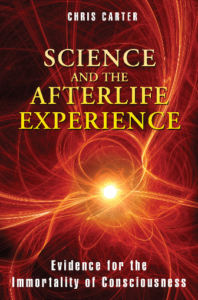Review
When Chris Carter’s first book came out he mentioned he’d originally tried to do it all in a single volume, but was advised to separate it into three. As a writer who was trying to do something similar I could readily relate to that, but didn’t think that I had that option. As a result I spent a lot of time trying to telescope complex arguments into a small space.
Carter, by contrast, has given himself the room to do full justice to the various different topics. His first two instalments tackled psi research and NDEs. With this latest book on survival-related research – spirit communications, apparitions and memories of a past life – he has carried his ambitious trilogy to a triumphant conclusion.
This is more than a survey; it’s an uncompromisingly partisan argument in favour of survival. The last person to make the case with philosophical rigour was Robert Almeder some twenty years ago, and it’s fitting that the book includes an foreword by him. An earlier one was by CJ Ducasse, which Carter frequently references, also perhaps CD Broad’s Lectures in Psychical Research, but these of course didn’t include near-death experiences or evidence for reincarnation. Stephen Braude’s Immortal Remains is up there too, but, like Broad, he’s more concerned with exploration than in making a committed statement. So it’s not a crowded field.
The advantage of having plenty of room is that the topics are pretty comprehensively covered, with case studies representing a good range of evidence and illustrating all the main issues. It’s also admirably laid out and structured. Much of the material is probably familiar to anyone who is reasonably well read in psychic research. On the other hand there were quite a few examples which I was glad to be reacquainted with, and others which were completely new, leaving me with the feeling that I don’t know as much as I thought I did. One such is the chess match between living and deceased grandmasters, concluded in 1993, via a medium who knew nothing about chess – an extraordinary and apparently successful experiment.
I thought it was brave of Carter to tackle the cross correspondences, which to get the full impact of requires a knowledge of ancient Greek and Roman literature that few now possess. I’m still not convinced that they make the case for survival as watertight as the SPR researchers at the time clearly thought it did. But at the very least one can clearly see the convincing appearance of their deceased colleagues trying to come up with ways to persuade them that mediumistic communications are not just confabulations in the minds of the living.
But could that not be the case? The nub in books about survival is what to do about the super-psi hypothesis, the possibility that survival evidence can be more economically explained in terms of a virtually boundless psi capacity in living humans. I’m used to seeing this quite fully described with some seriousness – and in Stephen Braude’s case, with a large degree of sympathy – as if it’s a real contender. Carter will have none of this, and in what, for me, was one of the best chapters of the book, provides a full array of cogently argued examples to show why it is untenable.
That is one of the most striking characteristics of Carter’s writing, his unwillingness to make the slightest concession to sceptics. This book takes full account of possible counter explanations, and indeed is largely concerned with showing why they must be set aside in the key cases he describes. But unlike the two earlier ones it does not focus very much on individual debunkers. When they do appear, it is to no great effect. For instance Paul Edwards is brought in as the chief prosecutor in the section on reincarnation, but since his basic position is that survival and reincarnation are simply incredible, and for that reason cannot possibly be true, one is left feeling that there is not much to argue about.
A part of me thinks that agnostic readers may object to this, believing that Carter is not giving their natural objections fair representation. After all, they may reason, if traditional materialist science rejects the idea of survival so completely, then its arguments must surely be stronger than Carter is letting on. Another part of me recognises that he is right, at least as far as psychic research is concerned: the evidence, across several different categories, locks together to provide an absolutely convincing case.
So I certainly don’t disagree with Carter about his conclusions, which I think are absolutely warranted. I also think this book, and the trilogy as a whole, is a tour-de-force, and that it’s vital that authoritative interpretations like this are available to set against the productions of sceptics like Richard Wiseman, which, alas, seem to get much more exposure. The really big question is whether the books we write about survival will ever make much difference to public perceptions.
Reading Carter’s book reawakened in me that sense of wonder that something so entirely obvious should in our time be so effectively suppressed. The bottom line is that a great many people – clever and humane – will take their first steps in a new existence filled with puzzlement, confusion and perhaps even anxiety. That surely can’t be a good thing. But if we want to address this, we will have to find ways to get them even to consider the question, never mind weighing up the pros and cons of the evidence.
Reviewed by Robert McLuhan, journalist, editor of Psi Encyclopedia and author of Randi’s Prize: What Sceptics Say About the Paranormal, Why They Are Wrong, and Why It Matters.
